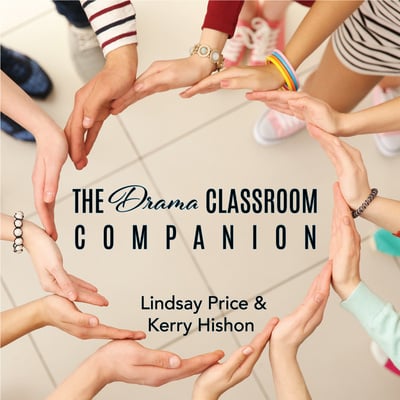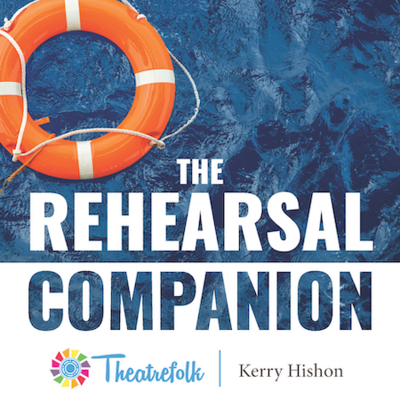A squirt gun would never be mistaken for a real gun, right? Dive into the thought-provoking world of Water. Gun. Argument and challenge what we choose to believe. A thought provoking and powerful piece in a docu-theatre style.
How to Get Student Actors to Stop Rushing
A director friend recently sent me a message asking for advice about how to help her students with their upcoming show.
Hi Kerry,
Any tips on helping my students to slow down and stop rushing? There are a few spots in the show where moments are “urgent,” but I feel that the audience is going to miss things as the students rush. We do walk-throughs, I explain and ask them to slow down, but they seem to get caught up in the excitement. Or perhaps they’re convinced it doesn’t look authentic? Maybe this will naturally evolve this week as they become more comfortable off-book, but any suggestions in the meantime would be helpful.
I guarantee this is not the first director dealing with students who rush their lines and movements. Your first task is to try and discover why your students are rushing their lines and/or movements. Then, you can try some of the following 12 tips and techniques I’ve used in various situations with my students to help them slow down:
1. “Slow down” might not be specific enough for your students. Try adding gestures or facial expressions at specific points in the scene to help your students focus on their full performances. Some students are visual learners, so physically demonstrating the movements you want may be helpful. Our Physicalizing Emotions article might help with this.
2. You may also want to try building in specific pauses and physical stops during students’ lines to force them to slow down. Try giving the exact counts you’d like the pause to be (for example, three seconds versus one second). Alternatively, have students try pausing for one beat for a comma or semicolon and two beats for a period, question mark, or exclamation mark.
3. Some students don’t believe us when we tell them what they’re doing until they see it themselves. Try filming students’ run-throughs and show them exactly what they are doing and how much they’re rushing. (I had a director do this to me once — it worked and I finally made the correction!)
4, You could also make rehearsal reference videos of the time(s) when students perform the scene the way you want them to, and make those the official templates of what they need to do each time.
5. If students are not fully off-book or are feeling shaky with their lines, they may be rushing to get the scene over with. Here are some tips to help students memorize their lines. The sooner they have their lines learned, the easier it will be for them to sink comfortably into the scene and avoid rushing.
6. Many students deal with nerves or anxiety, which may cause them to rush their lines or movements. Try some mindfulness techniques to help them combat jitters and see if that helps them slow down and stop rushing.
7. Try having students run their lines deliberately slowly — at half-speed or even slower. What they feel is half-speed is probably an appropriate speed for the stage!
8. If students are rushing their movements during the scene, have them try the scene while moving at half-speed or even standing still or sitting. How does that affect their performance?
9. If you find students are rushing their stage combat choreography, fight directors say that stage combat performance speed is maximum 75% of a “real” fight. Both because the two combatants need to be able to see what’s happening and the audience needs to know what’s happening. If they move too fast, the audience will miss the important moments. It’s not like on film, where the action can be sped up. Onstage, we have to suspend our disbelief in order for the action to be seen and understood.
10. Think scientifically. Have students consider what their bodies do biologically when they are excited or nervous. What happens when students feel an adrenaline spike? Explain that if they are rushing now in rehearsal, they’ll rush even more when show week adrenaline hits. Your 90-minute show may end up being only an hour!
11. Put yourself in the audience’s shoes. Sit your students down and have a frank conversation, considering the situation from the audience’s perspective. The students know the show — the audience doesn’t. The audience paid to be there and hear the story that the actors are presenting. If audience members can’t understand what’s going on, that’s not their fault — it’s up to the actors to help them understand.
12. Have students perform their scenes in front of their peers and have their peers give feedback on the speed. Sometimes having the feedback come from their friends and classmates can be more palatable to students. Alternatively, have someone who isn’t part of the show (such as another teacher) sit in on a rehearsal and watch/listen for rushing, as a neutral party who isn’t familiar with the scenes.
Related Articles
The Drama Classroom Companion
by Lindsay Price & Kerry Hishon
The Drama Classroom Companion is filled with articles and exercises to build the skills needed for theatrical performance as well as real world skills like creative thinking, critical thinking, collaboration, and communication.
The Rehearsal Companion
by Kerry Hishon
You’ve chosen the play, paid the royalties, done the script analysis, held your auditions, and cast the show. Tomorrow is the first rehearsal. Are you ready? Really ready? The Rehearsal Companion can help!



